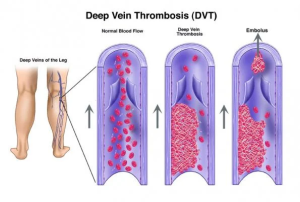
Deep Vein Thrombosis (DVT) is a serious medical condition that occurs when a blood clot forms in one or more of the deep veins in your body, usually in your legs. DVT can cause leg pain or swelling, but also can occur with no symptoms. Understanding the risks, symptoms, and treatment options for DVT is essential for preventing complications, including the potentially life-threatening pulmonary embolism (PE).
What is Deep Vein Thrombosis?
Deep vein thrombosis is characterized by blood clots that form in the deeper veins of the body. These clots can block normal blood flow, causing swelling and pain in the affected areas. If a clot breaks loose, it can travel through the bloodstream to the lungs, leading to a pulmonary embolism, a critical condition that can cause death if not treated promptly.
Causes of DVT
DVT can occur for a variety of reasons, with some individuals having a higher risk due to genetic factors. However, several common conditions and behaviors can increase the likelihood of developing DVT:
- Prolonged Inactivity: Long periods of sitting, such as during flights or being bedridden after surgery, can decrease blood circulation, which increases the risk of clot formation.
- Injury or Surgery: Damage to a vein’s inner lining, due to injury or during surgery, can lead to clot formation.
- Certain Medical Conditions: Heart disease, lung disease, cancer, and inflammatory bowel disease are among the conditions that increase DVT risk.
- Pregnancy: Pregnancy increases the pressure in the veins of the pelvis and legs, which can cause blood clots.
- Hormone Therapy or Birth Control Pills: These can increase the blood’s ability to clot.
- Smoking: Smoking affects blood clotting and circulation, increasing DVT risk.
Symptoms of DVT
Recognizing the symptoms of DVT is critical for early detection and treatment. Common symptoms include:
- Swelling in the affected leg: Rarely, there may be swelling in both legs.
- Pain in your leg: The pain often starts in your calf and can feel like cramping or soreness.
- Red or discolored skin on the leg.
- A feeling of warmth in the affected leg.
Complications of DVT
The most severe complication of DVT is a pulmonary embolism (PE). When a blood clot travels to the lungs and blocks a blood vessel, it can cause:
- Shortness of breath: This can occur suddenly and may worsen with exertion.
- Chest pain: This may be felt particularly when you breathe deeply, cough, eat, bend, or stoop.
- Cough: The cough may produce bloody or blood-streaked sputum.
Preventing DVT
Prevention of DVT is crucial, especially for those at higher risk. Here are some strategies to help prevent DVT:
- Stay Active: Regular physical activity improves blood flow and reduces the risk of clotting.
- Manage Weight: Maintaining a healthy weight reduces pressure on veins.
- Stay Hydrated: Drinking plenty of fluids promotes good blood circulation.
- Compression Stockings: These can be worn to prevent swelling and reduce the chance of clotting.
Treatment for DVT
Treatment aims to prevent the clot from getting bigger and prevent it from breaking loose and causing a PE. Treatment options include:
- Anticoagulants: Also known as blood thinners, these are the most common medications for treating DVT. They can decrease the ability of the blood to clot.
- Thrombolytics: These drugs can dissolve clots but are reserved for individuals at high risk of complications.
- Filters: In some cases, a filter may be placed in the large abdominal vein (inferior vena cava) to prevent clots from traveling to the lungs.
Conclusion
Deep Vein Thrombosis is a potentially life-threatening condition, but with the right knowledge and precautions, it can be managed and prevented. If you experience any signs or symptoms of DVT, seek medical attention immediately. Regular check-ups and staying active are vital components in preventing DVT and maintaining overall health.
If you have concerns about vascular health or need professional advice on managing vascular issues, don’t hesitate to reach out. Contact us at drsravanvascular@gmail.com or call +91 99945 43335 to schedule a consultation. Our expert team is here to provide you with personalized care and support for all your vascular health needs.
